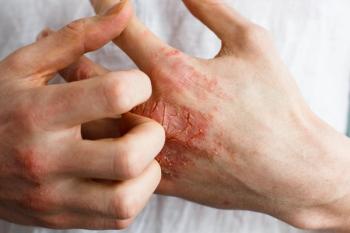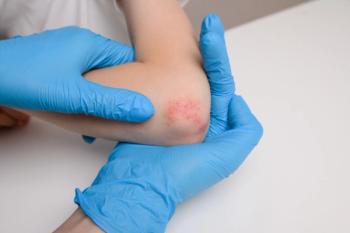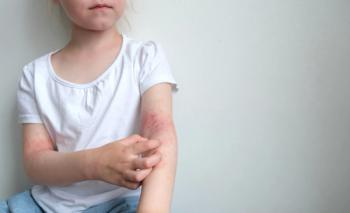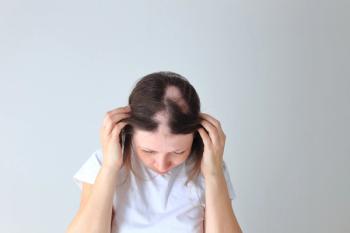
Drug Review: Lebrikizumab-lbkz Demonstrates Improvement in Atopic Dermatitis
FDA approval was granted on September 13, 2024.
Lebrikizumab-lbkz (Ebglyss) is a targeted IL-13 inhibitor used for the treatment of adults and children aged 12 years and older with moderate to severe atopic dermatitis despite treatment with topical therapies. Lebrikizumab-lbkz targets the inflammation throughout the body to reduce symptoms of dry, irritated skin. Lebrikizumab-lbkz was approved by the FDA on September 13, 2024.1
Indication
Lebrikizumab-lbkz is used for the treatment of adults and children 12 years of age and over. These patients must weigh over 40 kgs (88lbs) and who have moderate to severe atopic dermatitis despite treatment with prescription topical therapies.
Mechanism of Action
Lebrikizumab-lbkz is an IgG4 monoclonal antibody that specifically targets IL-13. This also inhibits human IL-13 signaling through the IL-4Rα/IL-13Rα1 receptor complex. IL-13 is a cytokine which is involved in Type 2 inflammation, which plays a role in the pathogenesis of atopic dermatitis. Lebrikizumab-Ibkz blocks the IL-13-induced responses, as well as the proinflammatory cytokines, chemokines and IgE.
Dosing and Administration
Lebrikizumab-lbkz 250 mg/2 mL is a subcutaneous injection which may be used with or without topical corticosteroids. After the first treatment phase, it is administered as a single monthly maintenance injection. The initial dose of lebrikizumab-lbkz is 500 mg at Weeks 0 and 2, followed by 250 mg every 2 weeks until week 16 or later. Once an adequate clinical response is achieved, patients transition to a maintenance dose that includes a single 250 mg injection every 4 weeks.
Injection sites include the abdomen, thigh, and back of the upper arm. Do not inject lebrikizumab-lbkz into areas of skin that is affected by atopic dermatitis where the skin is tender or bruised.
Clinical Studies
Lebrikizumab-lbkz approval was based on data from the ADvocate 1 (
ADvocate 1 and ADvocate 2 were 52-week, randomized, double-blind, placebo-controlled, phase 3 studies. Lebrikizumab-lbkz was given as monotherapy in adults and children aged 12 to 18, weighing at least 40 kg, with clear or almost clear skin as the primary endpoint at 16 weeks. During the 16-week induction phase, participants received an initial 500 mg dose of lebrikizumab-lbkz followed by a second dose 2 weeks later and 250 mg lebrikizumab-lbkz every 2 weeks.
READ MORE:
During the maintenance period, patients who achieved a clinical response were re-randomized to receive
In these studies, 38% of participants taking lebrikizumab-lbkz achieved clear or almost clear skin at 16 weeks vs 12% in the placebo group, with 10% of participants seeing results within 4 weeks. For those achieving clear or almost clear skin at week 16, 77% maintained it for a year with each dose given monthly. A total of 43% of participants reported itch relief at 16 weeks with lebrikizumab-lbkz (vs 12% on placebo); 85% maintained relief at 1 year with monthly dosing. Results of these studies were published in the New England Journal of Medicine.4
ADhere was a 16-week, randomized, double-blind, placebo-controlled, parallel-group, global phase 3 study evaluating the efficacy and safety of lebrikizumab-lbkz in combination with topical corticosteroids.
Contraindications/Warnings and Precautions
Lebrikizumab-lbkz is contraindicated in individuals with a known hypersensitivity to the product. Therapy should be discontinued if a serious hypersensitivity reaction occurs, such as angioedema or urticaria. Any new or worsening eye symptoms, such as conjunctivitis or keratitis, should be reported to a health care provider. The use of live vaccines should be avoided during treatment with lebrikizumab-lbkz.
Drug Interactions
The effect of lebrikizumab-lbkz with other drugs has not been studied.
Special Populations
The available data on the use of lebrikizumab-lbkz in pregnant women are insufficient to evaluate for a drug-associated risk of major birth defects, miscarriage, or other adverse maternal or fetal outcomes.
There is no current evidence of the presence of lebrikizumab-lbkz in human milk and adverse effects to the infant.
Pediatric Use
The safety and effectiveness of lebrikizumab-lbkz has been established in pediatric patients 12 years of age and older, weighing at least 40 kg, with moderate to severe atopic dermatitis, and whose disease is inadequately controlled with topical prescription therapies or when those therapies are not available. The safety and effectiveness of lebrikizumab-lbkz has not been established in those under 12 years of age or in pediatric patients 12 years and older who weigh less than 40 kg.
Geriatric Use
There is insufficient clinical information on lebrikizumab-lbkz, as studies did not include enough participants over 65 years of age and older.
Patients with Renal or Hepatic Impairment
There are no clinically significant pharmacokinetic differences in patients with mild to moderate renal impairment. Lebrikizumab-lbkz is a monoclonal antibody, and is not expected to undergo significant hepatic or renal elimination.
Adverse Effects
The most common adverse reactions are conjunctivitis, injection site reactions, and herpes zoster.
Storage and Handling
lebrikizumab-lbkz should be refrigerated at 2°C to 8°C (36°F to 46°F). It can be kept at room temperature up to 30°C (86°F) for up to 7 days in its original carton if needed. If left at room temperature for more than 7 days, discard lebrikizumab-lbkz in a sharps container. Keep it in the original carton to protect from light until ready for use. Do not freeze, and do not use lebrikizumab-lbkz if it has been frozen. Do not shake the product; do not heat it using a microwave or expose to direct sunlight.²
READ MORE:
Allison Ketterer is a student pharmacist at Duquesne University School of Pharmacy, anticipated to graduate in spring 2025. She completed this research while on Advanced Pharmacy Practice Rotation at STACK, focused on specialty pharmacy, entrepreneurship, and technology. For more information, or to inquire about APPE programs at STACK, please visit
References
FDA approves Lilly’s Ebglyss (lebrikizumab-lbkz) for adults and children 12 years and older with moderate-to-severe atopic dermatitis. News release. Eli Lilly. September 13, 2024. Accessed November 25, 2024.
https://investor.lilly.com/news-releases/news-release-details/fda-approves-lillys-ebglysstm-lebrikizumab-lbkz-adults-and Ebglyss prescribing information. Eli Lilly. Accessed November 25, 2024.
https://pi.lilly.com/us/ebglyss-uspi.pdf?s=pi Atopic dermatitis. National Institute of Arthritis and Musculoskeletal and Skin Diseases. Accessed November 25, 2024.
https://www.niams.nih.gov/health-topics/atopic-dermatitis Silverberg JI, Guttman-Yassky E, Thaçi D, et al; for the ADvocate 1 and ADvocate 2 Investigators. Two phase 3 trials of lebrikizumab for moderate-to-severe atopic dermatitis. N Engl J Med. 2023;388:1080-1091. doi:10.1056/NEJMoa2206714
Newsletter
Pharmacy practice is always changing. Stay ahead of the curve with the Drug Topics newsletter and get the latest drug information, industry trends, and patient care tips.























